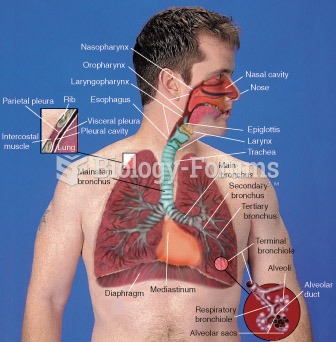|
|
|
When intravenous medications are involved in adverse drug events, their harmful effects may occur more rapidly, and be more severe than errors with oral medications. This is due to the direct administration into the bloodstream.
In the United States, there is a birth every 8 seconds, according to the U.S. Census Bureau's Population Clock.
The most common treatment options for addiction include psychotherapy, support groups, and individual counseling.
Aspirin is the most widely used drug in the world. It has even been recognized as such by the Guinness Book of World Records.
Amphetamine poisoning can cause intravascular coagulation, circulatory collapse, rhabdomyolysis, ischemic colitis, acute psychosis, hyperthermia, respiratory distress syndrome, and pericarditis.







